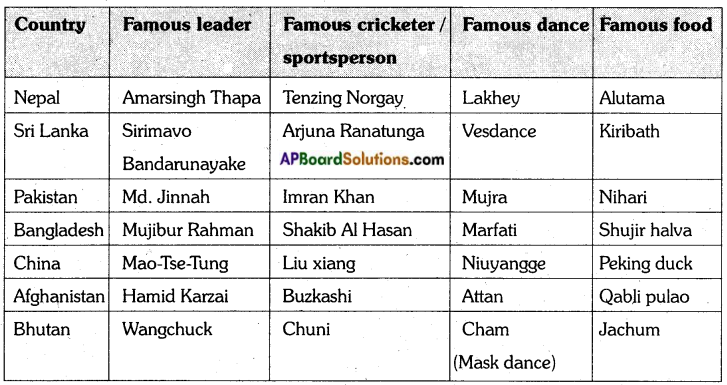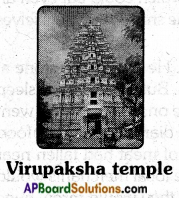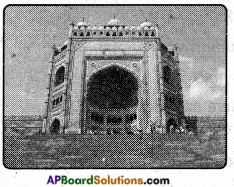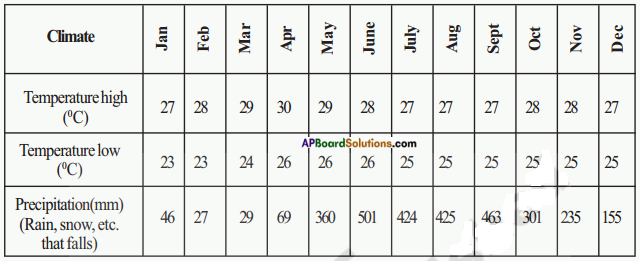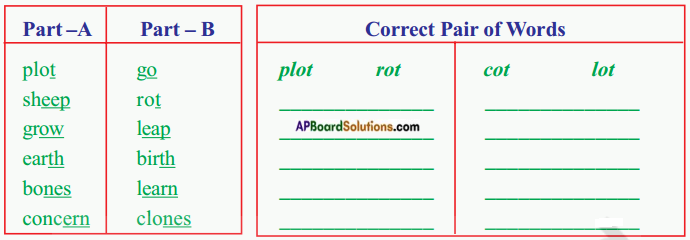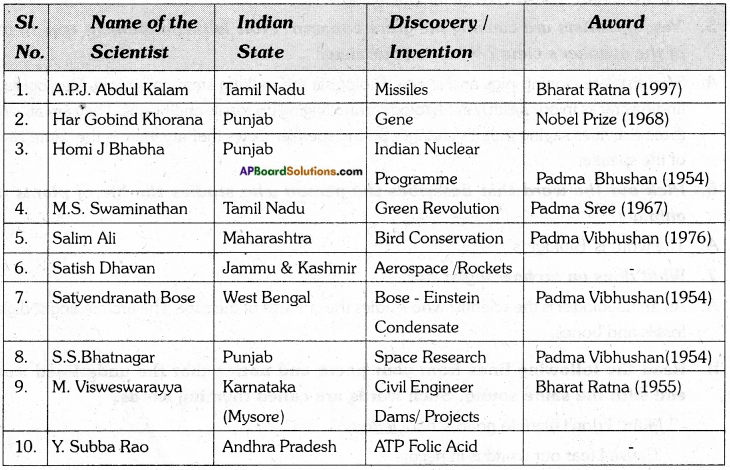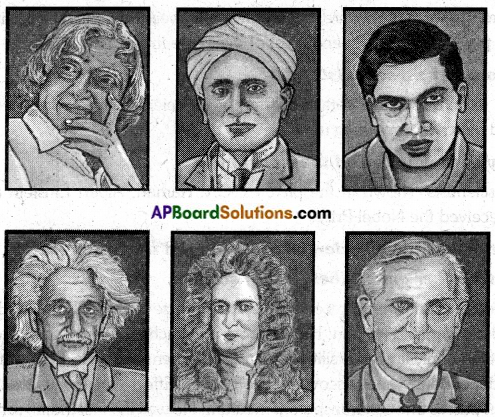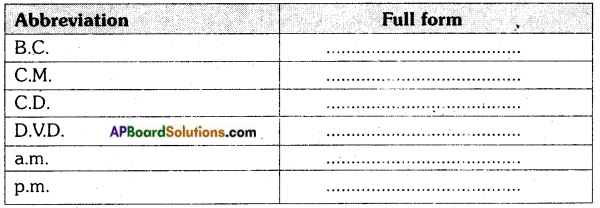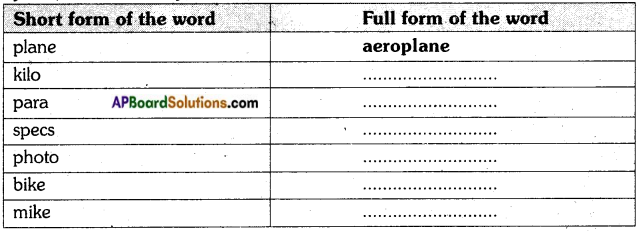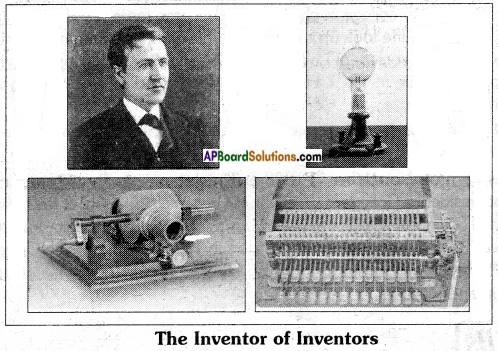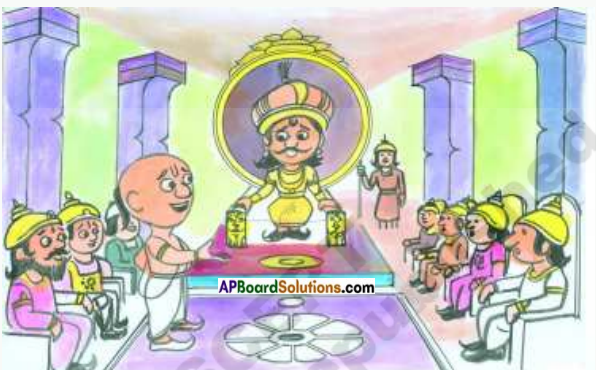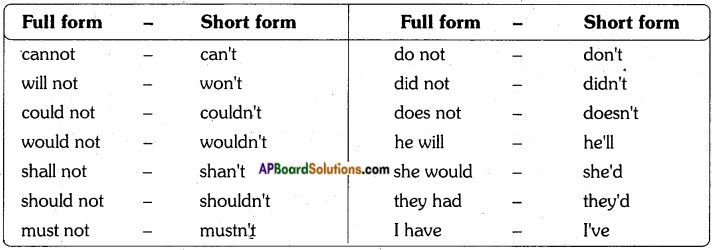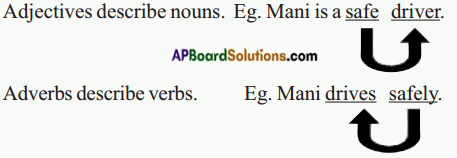AP State Syllabus AP Board 7th Class English Textbook Solutions Chapter 3A Puru, the Brave Textbook Questions and Answers.
AP State Syllabus 7th Class English Solutions Chapter 3A Puru, the Brave
7th Class English Chapter 3A Puru, the Brave Textbook Questions and Answers
Look at the picture and answer the questions that follow.
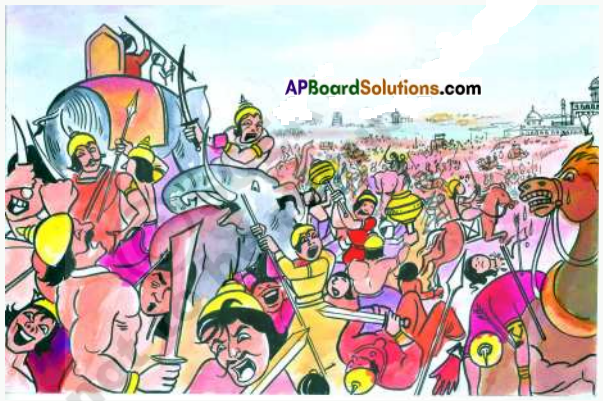
Question 1.
Talk about what is happening in the picture.
Answer:
It is the scene of a fierce battle of ancient times. It appears to be completely an Indian battle. The soldiers of both the sides of the battle are using the old instruments of warfare – swords, daggers and spears. Battle is going on fiercely. The soldiers are slashing their swords with lightning speed. Though they are well armoured the soldiers of both sides are wounded seriously. Their heads are cut off. Some lost their limbs. The battle field must have become red with the bloodshed.

Question 2.
What do you think may be the cause of the war?
Answer:
The thirst of conquering the other’s kingdom.
Question 3.
Who is Puru? What do you know about him?
Answer:
Puru is a brave king. He fights bravely. He is patriotic and a man of self-respect.
I. Answer the following questions.
Question 1.
Who is Alexander?
Answer:
Alexander is the King of Macedonia.
Question 2.
Why did the generals and Alexander think that the battle of Jhelum would go down in the history of the world?
Answer:
They thought that it would go down in the history of the world because they had never fought such a battle before. Every Indian soldier fought like a hungry tiger. The Greeks had to fight hard until Puru was injured and captured.
Question 3.
What do you think is the reason for Indian soldiers’ defeat?
Answer:
Indian soldiers fought bravely like tigers. But the generals were not so skilful as the Greek generals. They followed the old methods of warfare. They depended more upon their elephants. So they were defeated.
Question 4.
Do you think that Indian generals were not as brave as the Greek generals?
Answer:
No, I don’t hink so. Our Indian generals were braver than the Greek generals. Even Alexander himself admitted this fact and said he had the highest respect for them.
Question 5.
Do you believe that Puru was really proud ? Give reasons. Do you justify his pride? How?
Answer:
No. Puru was not really proud. He was a man of self-respect. He showed how a king should behave with another king. He did not misbehave with Alexander. Moreover he greeted Alexander when he entered the court. Thus his pride was justifiable.

Question 6.
If you were Alexander, what would you do with Puru?
Answer:
If I were Alexander, I too would behave like Alexander. I mean that Alexander respected and honoured Puru in apt way 1 too would like to have friendship with Puru.
II. Tick (✓) the correct answers.
1. Alexander asked his soldiers to remove the chains of Puru because ( )
a) he was sympathetic to Puru.
b) he did not like a brave man like Puru in chains.
c) Puru requested Alexander to remove his chains.
d) Alexander did not dare see Puru in chains.
Answer:
b) he did not like a brave man like Puru in chains.
2. Puru did not accept Alexander’s proposal to be a vassal because ( )
a) he was very proud.
b) he was very brave and patriotic,
c) he was not very wise.
d) he did not have respect for Alexander.
Answer:
b) he was very brave and patriotic
3. Alexander made friends with Puru because, ( )
a) Puru accepted that Alexander was really great.
b) Alexander wanted to make use of Puru’s services.
c) Alexander liked Puru’s bravery and self-respect.
d) Alexander was very kind.
Answer:
c) Alexander liked Puru’s bravery and self-respect.

4. Alexander was really great because, ( )
a) he defeated Puru.
b) he made friends with a brave king like Puru. .
c) he defeated Puru, set him free, respected, and made friends with him.
d) he was the conqueror of the world.
Answer:
c) he defeated Puru, set him free, respected, and made friends with him.
I. Pick out the antonyms from the text for the words given below.


Answer:
1) defeat
2) brave
3) proud
4) reject
5) independent
II. Fill in the blanks in the following paragraph with the words given in the box.

I know that you are very ……………………… and ………………………. of the position you hold. But I am really ………………….. to know that you feel as though you have ……………… the world. These days nobody is being …………………. by the other. I would like to make a ……………………. so that you will ……………………. humble and ………………… I hope my words …………………. your imagination and you ………………….. me as your teacher.
Answer:
1) skilful
2) worthy
3) amazed
4) conquered
5) frightened
6) proposal
7) remain
8) lawful
9) capture
10) respect

III. Look at the following words from the text: 1. independent 2. difference
The word ‘precaution’ consists of two parts – ‘in-’ and ‘dependent’ (prefix+root).
The word ‘dangerous’ consists of two parts ‘differ’ and ‘-ence’ (root+suffix).
Add appropriate prefixes / suffixes to the following roots to make new words. The first one is done for you

Answer:

Fill in the blanks in the following sentences with suitable forms (after adding a prefix/suffix) of the words in brackets.
1. He was acting in a very ——– way. (child)
2. This word is very difficult to spell, and even worse, its ——–. (pronounce)
3. You shouldn’t have done that! It was very ——– of you. (think)
4. He didn’t pass his exam. He was ——– in the second attempt. (succeed)
5. Some of the Indian cities are dreadfully ——–.(crowd)
6. The team won the ——–. (champion)
7. There is a very high ——– that they will be late, (likely)
8. I couldn’t find any ——– in his theory, (weak)
9. There was a three-hour ——– because of the strike, (stop)
10. You need a ——– of motivation, organization and revision to learn English.(combine)
Answer:
1) childish
2) pronunication
3) ill thinking
4) successful
5) crowdy
6) championship
7) likelihood
8) weakness
9) stoppage
10) combination

Grammar
I. Let’s have a look at the following sentences from the text.
1. My kingdom should remain independent.
2. You should treat me as your equal.
3. I must say every Indian soldier fought like a tiger.
In sentence 1, should indicates obligation whereas in 2, it indicates condition.
In sentence 3, “must’ is used to indicate insistence on the part of the speaker / necessity.
It is also used when the speaker has authority over the listener.
It is important to understand how the modals ‘should’ and ‘must’ are used.
(People sometimes use should to indicate something that is desirable and must to indicate obligation. However, some people use them interchangeably.)
Now fill in the blanks in the following paragraph with ‘should or ‘must’.
I –(1)– say that you –(2)– come to school regularly because you cannot miss important lessons. You –(3)– attend extra classes in time tomorrow. Otherwise I will punish you. You –(4)– return my book which I gave you month ago. You –(5)– change your habits otherwise you will not come up in life.
Answer:
1) should
2) must
3) must
4) must
5) should
Now read the conversation between a doctor and a patient and fill in the blanks with should (should not) and must (must not).
Doctor: Mr. Rao, what exactly is your problem?
Patient: I’ve been suffering from gastric problem for a long time.
Doctor: Mr. Rao, I (1)………. say you (2)………. eat non-vegetarian or spicy food for sometime.
Patient: Can I eat boiled eggs or omelette, doctor?
Doctor: Isn’t an egg non-vegetarian ? You (3)………. eat any non-vegetarian food for quite some time. In fact, you (4)………. have stopped eating it long ago. You (5)……….. consult me in a week.
Patient: I am sorry, doctor. I won’t eat non-vegetarian food any longer. You are quite correct, doctor. I (6)………. take your advice and (7)………. avoid eating non-vegetarian and spicy food. Thank you very much, doctor.
Doctor: You are welcome. In think you (8)………. remember my advice.
Answer:
1) must
2) should not
3) must hot
4) should
5) must
6) must
7) must
8) should

II. Look at the following sentences from the text:
1. But their generals are not so good as ours.
2. The Indian generals are not so skillful as the Greek generals.
3. It has been a great battle – perhaps the greatest of my life.
In the above sentences 1&2, the Indian generals are compared with Greek generals. The third sentence means that it was the greatest or the best battle of all his (Alexander’s) battles. When we want to compare one thing with the other, we use degrees of comparison – positive, comparative and superlative forms of adjectives.
If we compare two things or two sets of things, we use positive or comparative forms of adjectives. If we compare more than two things or two sets of things, we use the superlative form of adjectives. We can transform positive, (comparative and superlative degrees) into comparative and superlative and vice versa.
Let us observe the sentences 1 and 2 above.
1. Their generals are not so good as ours.
2. Indian generals are not so skillful as the Greek generals.
The underlined words in the above sentences are adjectives. These are the positive forms of adjectives. The other forms of these adjectives are given below.
Positive Comparative Superlative
good better best
skillful more skillful most skillful
The two sentences are said to be in the positive degree since the adjectives are in the positive degree.
They can be transformed into comparative degree by changing the adjectives into comparative degree and making certain other changes.
Sentences 1 and 2 can be changed into comparative forms as shown below:
1. Our generals are better than their generals.
2. The Greek generals are more skillful than Indian generals.

Now look at the third sentence.
It is the greatest battle of my life.
The above sentence can be turned into the comparative and positive degrees as shown below.
It is greater than any other battle of my life.
No other battle of my life is so great as this.
Now look at the following sentence in the superlative degree of comparison:
Puru is one of the bravest kings in the world.
This sentence means that there are a few kings in the world who are as brave as Puru. It also means that Puru is not the only bravest king in the world. Let’s see how the above sentence can be transformed into comparative and positive degrees of comparison.
Puru is braver than many other/ most of the other kings in the world (Comparative)
Very few kings in the world are as brave as Puru. (Positive Degree)
Observe the following forms of comparison of some adjectives.
| Positive Degree | Comparative Degree | Superlative Degree |
| nice | nicer | nicest |
| short | shorter | shortest |
| big | bigger | biggest |
| great | greater | greatest |
| fast | faster | fastest |
| worthy | worthier | worthiest |
| frightened | more frightened | most frightened |
| lawfyl | more lawful | most lawful |
| brave | braver | bravest |
Change the following sentences into other forms of comparison as indicated in brackets.
1. Rahul Dravid is one of the greatest batsmen in the world. (comparative degree)
Answer:
Rahul Dravid is greater than many other batsmen in the world.
2. Alexander was the greatest soldier in the world. (positive degree)
Answer:
No other soldier in the world was as great as Alexander.
3. India is one of the fastest developing countries in the world. (comparative degree)
Answer:
India is developing faster than many other countries in the world.
4. No other river in the world is so long as the Nile. (superlative degree)
Answer:
The Nile is the longest river in the world.
5. Hindi is one of the most popular languages in India. (positive degree)
Answer:
Very few languages in India are as popular as Hindi.

6. Lara is not so great as Tendulkar. (comparative degree)
Answer:
Tendulkar is greater than Lara.
7. Rekha is one of the most beautiful girls in the class. (positive degree)
Answer:
Very few girls in the class are as beautiful as Rekha.
8. Very few metals are as expensive as platinum. (comparative degree)
Answer:
Platinum is more expensive than many other metals.
9. Shimla is colder than all other hill stations in the Himachal Pradesh. (superlative degree)
Answer:
Shimla is the coldest hill station in Himachal Pradesh.
10. Delhi is one of the most crowded cities of India. (positive degree)
Answer:
Very few cities of India are as crowded as Delhi.
Writing
I. Given below are some jumbled sentences. Rearrange them in the right order and write a meaningful paragraph by using appropriate connectives.
1. Alexander asked Puru why he had rejected his offer.
2. Alexander defeated many kings besides Puru, became the world conqueror, and was called Alexander the Great.
3. Alexander was born in Greek and he was the disciple of the greatest Greek philosopher, Aristotle.
4. Puru lost the battle though his generals and soldiers fought very bravely.
5. Alexander asked his generals to remove the chains and bring Puru to him.
6. Puru killed more than one hundred soldiers but he was gravely injured and chained in the battle.
7. Puru lost the battle as he had used the oldest methods of warfare and elephants.
8. Puru said that he was the lawful owner of his kingdom.
9. Puru was a brave king and a great soldier of Northern India.
10. Alexander liked Puru’s bravery and self-respect , so he became his best friend.
11. There was a great battle between Alexander and Puru on the banks of Jhelum.
12. Alexander asked Puru to be his vassal but he refused.
Answer:
1. Alexander was born in Greek and he was the disciple of the greatest Greek philosopher, Aristotle. (3)
2. Puru was a brave king and a great soldier of Northern India. (9)
3. Alexander asked Puru to be his vassal but he refused. (12)
4. There was a great battle between Alexander and Puru on the banks of Jhelum. (11)
5. Puru killed more than one hundred soldiers but he was gravely injured and chained in the battle. (6)
6. Puru lost the battle though his generals and soldiers fought very bravely. (4)
7. Puru lost the battle as he had used the oldest methods of warfare and elephants. (7)
8. Alexander asked his generals to remove the chains and bring Puru to him. (5)
9. Alexander asked Puru why he had rejected his offer. (1)
10. Puru said that he was the lawful owner of his kingdom. (8)
11. Alexander liked Puru’s bravery and self-respect, so he became his best friend. (10)
12. Alexander defeated many kings besides Puru, became the world conqueror, and was called Alexander the Great. (2)

Forming a paragraph by placing the jumbled sentences in the right order:
Alexander was born in Greek and he was the disciple of the greatest Greek philosopher, Aristotle. Puru was a brave king and a great soldier of Northern India. Alexander asked Puru to be his vassal but refused. So there was a great battle between Alexander and Puru on the banks of Jhelum. Puru killed more than one hundred soldiers but he was gravely injured and chained in the battle. Puru lost the battle though his generals and soldiers fought very bravely. He lost the battle because he had used the oldest methods of warfare and elephants Alexander asked his generals to remove the chains and bring Puru to him. He asked Puru why he had rejected his offer. Puru said that he was the lawful owner of his kingdom. So he rejected the offer of being his vassal. Alexander liked Puru’s bravery and self respect, so he became his best friend Alexander defeated many Kings besides Puru, became the world conqueror, and was called Alexander the great.
II. Rewrite the playlet as a short story. You may follow the steps given below :
Read the drama script as many times as necessary.
Answer the questions that follow.
Question 1.
Identify the major events depicted in the drama.
Answer:
Alexander asked Puru to be his vassal – great battle between Puru and Alexander – Puru lost the battle – Puru refused to be a vassal – Puru greatly injured, captured – chained – Puru used the oldest methods of warfare – Puru’s generals and soldiers fought bravely – Puru was / brought before Alexander – Alexander liked Puru’s bravery and self-respect – made friends with Puru.
Question 2.
Take turns and share the major events in the order they occur.
Answer:
- Alexander asked Puru to be his vassal.
- Puru refused to be a vassal.
- Great battle between Puru and Alexander.
- Puru’s generals and his soldiers fought bravely.
- Puru used the oldest methods of warfare.
- Puru lost the battle.
- Puru greatly injured, captured and chained.
- Puru was brought before Alexander.
- Alexander liked Puru’s bravery and self-respect.
- Made friends with Puru.

Question 3.
Expand each event in terms of:
a) the location where it takes place
b) the characters involved
c) what they say / think / involved
Answer:
a) Expanding the events in terms of the location where its takes place:
3. There was a great battle between Puru and Alexander on the banks of the river Jhelum:
4. Puru’s generals and soldiers fought bravely in the battle field.
8. Puru was brought before Alexander where he was conducting his camp court.
b) Expanding the events in terms of the characters involved:
1. Alexander was the king of Macedonia. His aim was to conquer the whole world.
2. Puru was a king of Northern India.
c) Expanding the events in terms of the characters what they say / think / feel.
At the camp court of Alexander, Alexander and his generals were discussing how bravely Puru and his soldiers fought. Generals said that the battle of Jhelum went down in the history of the world. Alexander admitted that it was the greatest battle he had ever fought. Alexander thought Puru’s faulty battle plans, using old methods of warfare and depending too much on elephants were the causes for Puru’s defeat.
Meanwhile Puru was brought before Alexander. Alexander asked him why he had rejected his offer to be his vassal while all the other kings gladly agreed to do so. Then Puru told that none of them was Puru.
Alexander asked Puru how he’ should treat him. Puru aksed him to treat him as a king should treat another king. .

Question 4.
Write the first draft.
Answer:
Alexander was the king of Macedonia. His aim was to conquer the whole world. Puru was a king of Northern India. Alexander asked Puru to be his vassal. Puru refused Alexander’s offer.
- There was a battle between Alexander and Puru on the banks of the river Jhelum. Puru and his generals fought bravely at the battle field. Puru was greatly injured.
- He was captured and he was chained. He lost the battle. At the camp court of Alexander, Alexander and his generals were discussing how bravely Puru and his soldiers fought. The generals opined that the battle of Jhelum would go down in the history of the world. Alexander admitted that it was the greatest battle he had ever fought. He thought that Puru’s faulty battle plans, his using of other oldest methods of warfare and depending too much on elephants were the causes for Puru’s defeat.
- Puru was brought before Alexander. Alexander asked his soldiers to remove his chains. He asked Puru why he had refused to be his vassal, while all other kings gladly agreed to so. Then Puru told that he was not a traitor like them. Alexander liked Puru’s bravery and self respect.
He asked Puru how he should treat him. Puru asked him to treat him as a king should treat another king. Alexander asked him whether he would be a friend to him. Puru agreed to be his friend only when Alexander agreed to keep his kingdom independent. - Conclusion to be added.
Question 5.
Edit and refine the draft.
Answer:
- So there was a great battle between Alexander and Puru on the banks of the river Jhelum.
- Puru was greatly injured, captured and chained.
- Meanwhile Puru was brought before Alexander after removing his chains.
- Thus the battle of Jhelum really went down in the history of the world. And Puru was remembered for his bravery, and for his sense of patriotism and self-respect.
Final draft:
Alexander was the king of Macedonia. His aim was to conquer the whole world. Puru was a king of Northern India. Alexander asked Puru to be his vassal. Puru refused Alexander’s offer. So there was a great battle between Alexander and Puru on the banks of the river Jhelum. Puru and his generals fought bravely at the battle field.
Puru was greatly injured, captured and chained. He lost the battle. At the camp court of Alexander, Alexander and his generals were discussing how bravely Puru and his soldiers fought. The generals opined that the battle of Jhelum would go down in the history of the world. Alexander admitted that it was the greatest battle he had ever fought. He thought that Puru’s faulty battle plans, his using of the oldest methods of warfare and depending too much on elephants were the causes for Puru’s defeat.

Meanwhile Puru was brought before Alexander after removing his chains. He asked Puru why he had refused to be his vassal, while all other kings gladly agreed to do so. Then Puru told that he was not a traitor like them. Alexander liked Puru’s bravery and self-respect.
He asked Puru how he should treat him. Puru asked him to treat him as a king should treat another king. Alexander asked him whether he would be a friend of him. Puru agreed to be his friend only when Alexander agreed to keep his kingdom independent.
Thus the battle of Jhelum really went down in the history of the world and Puru was remembered for his bravery, and for his sense of patriotism and self-respect.
Study Skills
There are many words which can function as more than one part of speech. For instance ‘talk’ can be used as a verb as well as a noun.
She talks at length about her dress.
Her talk is boring.
I. Refer to the dictionary and say whether the following words can be used as different parts of speech like a noun, a verb, an adjective, etc. The first one is done for you.

Answer:

Usage:
1. battle (n): The battle of Waterloo took place in 1815.
battle (v): She is still battling with her knee injury.
battle (adj): He ran away from the battle field.
2. chain (n): She wore a heavy gold chain.
chain (v): She chained the dog and welcomed us in.
3. conquer (v): Ashoka conquered Kalinga.
4. fight (v): We must fight against corruption.
fight (n): He put up a fight when the police tried to arrest him.
5. like (n): We all have different likes and dislikes.
like (prep): She is wearing a dress like mine.
like (v): I like sweets.
like (adj): She responded in like manner.
like (adv): it’s really hard. Like I have no time for my own mork.
like (conj): It didnt turn out like I intended.
6. refuse (v): She refused to accept that there was aproblem.
refuse (n): Municipal authorities asked the people to keep their domestic refuse in the
bins provided by the Municipality.
7. reject (v): The proposa! was firmly rejected.
reject (n): Mother Teresa used to serve the family rejects and the society rejects.
8. respect (n): 1 have the greatest respect for your brother.
respect (v): She had always been honest with me and I respect her for that.
9. talk (v): She talks at length about her dress.
talk (n): Her talk is boring.
10. treat (v): My parents still treat me like a child.
treat (n): We took the kids to the zoo as a special treat.

Listening and Speaking
Your teacher will read the passage “Nepal and the Himalayas”. Listen carefully and answer the questions given below:
Nepal lies between India and Tibet, among the Himalayan mountains. It is a country of mountains and valleys. The tallest mountain in the world, Mount Everest, is in Nepal. And there are several other mountains nearly as high. When mountaineers try to climb Mount Everest, they take the help of the Sherpas, who live in these mountains, to carry heavy loads and to act as guides.
A long time ago, the Sherpas crossed over the mountains from Tibet and made their homes along the slopes of the Himalayas in Nepal. So, they are rather like the people of Tibet to look at. Here, life is hard, and the entire family, including the children, have to work to get enough to eat.
The Sherpas grow potatoes, barley, garlic, and other vegetables. They also graze their yaks on the higher mountain slopes in the summer and on the lower slopes in the winter. The Sherpas use them for almost everything they need. They ride them, plough with them, and use them to carry their goods. The hairy wool of these animals is made into cloth and their skins into leather boots and tents. The yaks also provide milk, fat and meat. Their dung is dried and used as a fuel instead of wood or coal.
There are hardly any roads in the Himalayas, and everything has to be carried either on animals like yaks and donkeys or on human backs. Even children learn to carry heavy loads in large baskets which are tied to them. The baskets are big enough to carry a person.
The highest mountain tops of the Himalayas are cold, cheerless and covered with snow, but lower down one can find flowers in the spring and summer, and fir trees too. There are colourful butterflies, kites and eagles in the skies, and black and red Himalayan bears hiding in the rocks.
Though the Sherpas lead a tough life in their beautiful country, these small, dark haired people are always cheerful, and like most Buddhist people, they are friendly and kind.
Choose the right answer from the choices given below:
1. The passage is about . . . . . . . . . . . . . . . . . . ( )
a) Nepal
b) the Himalayas
c) the Himalayas and the Sherpas
d) none of these
Answer:
c) the Himalayas and the Sherpas
2. The Sherpas came from . . . . . . . . . . . . . . . . . . ( )
a) Nepal
b) Tibet
c) China
d) none of these
Answer:
b) Tibet

3. Lower down the Himalayas we can see . . . . . . . . . . . . . . ( )
a) colourful butterflies
b) kites
c) eagles
d) all of these
Answer:
d) all of these
4. The most useful animals for Sherpas are . . . . . . . . . . . . . . . . ( )
a) cows
b) buffaloes
c) yaks
d) none of these
Answer:
c) yaks
II. Read the following sentences and say whether they are true or false.
1. Mount Everest is iri India. ( )
2. There are many roads in the Himalayas. ( )
3. Even the children of Sherpas carry heavy loads. ( )
4. One can find flowers on the tops of the Himalayas. ( )
Answer:
1) False
2) False
3) True
4) False
Work in groups. Ask and answer the following questions:
Question 1.
What are the modes of transport in the Himalayas?
Answer:
Animals like yaks and donkeys or on human backs.
Question 2.
Why do Sherpas look like the people of Tibet?
Answer:
A long time ago, the Sherpas crossed over the mountains from Tibet and made their homes along with the slopes of the Himalayas in Nepal. So they look the people of Tibet.

Question 3.
What interesting things would you find in the Himalayas?
Answer:
There are hardly any roads in the Himalayas. Everything has to be carried either on animals like yaks and donkeys or on human backs. The highest mountain tops of the Himalayas are a cold, cheerless and covered with snow, but lower down one can find colourful butterflies, kites and eagles in the skies.
Listen to the following conversation:
Teacher: Meghana! Have you ever been to the Himalayas?
Meghana: No, Sir. I have never been to the Himalayas.
Teacher: Do you have any idea about the Himalayas?
Meghana: Yes, I do.
Teacher: Tell me whatever you know about it.
Meghana: Sir, the Himalayas are the highest mountains in the world.
Teacher: Oh! Are they? Then tell me which is the highest peak among them?
Meghana: Mount Everest, Sir.
Teacher: What sort of help is available to the climbers in the Himalayas?
Meghana: Sir, there are plenty of Sherpas.
Teacher: Who are these Sherpas?
Meghana: Sir, they are helpers in the mountains.
They carry our luggage to earn their living.
Teacher: Good. Meghana.
Meghana: Thank you, sir.
Work in groups and share your experiences about the place you have visited. You may talk about the following:
- The hill station you visited
- How you travelled
- When was it? Where did you stay?
- Who went with you?
- The places you visited. The places you liked and disliked.
- Any memorable experience or anecdote.
Answer:
A: Let’s talk about the places we visited.
B: Yes. To start with, I visited Lakshmi Narasimha Swami temple in Antharvedhi.
C: I had been to Papikondalu.
D: We once went to Ooty.
A: Shall we talk about our mode of travel?
B: Yes, of course! We travelled by a taxi.
C: I went there partly by bus and partly by boat.
D: Our journey was by train and car.
A: May I ask you where you stayed?
B: We stayed in a hotel.
C: We didn’t stay overnight. Our visit was of a few hours.
D: We booked accommodation in a private guest house.
A: Who accompanied you?
B: We all went with the members of our family.
C: We all went with the members of our family.
D: We all went with the members of our family.
A: What places did you see there?
B: M the important.places like lakes, temples, etc. we covered
C: All the important places like lakes, temples, gardens, hill stations we covered …
D: All the important places like lakes, temples, gardens, hill stations we covered …

Puru, the Brave Summary in English
Alexander was the King of Macedon. He conquered Greece, Persia etc. He also made several Indian kings his vassals.
Puru was a king of northern India. He was a brave soldier and a true patriot.
Alexander wanted to make Puru his vassal. So he sent Puru an offer that he would not fight a battle with Puru if he agreed to be his vassal. But Puru rejected his offer. So a great battle occurred between Alexander’s army and Puru’s army. It was such a great battle that Alexander’s army had to sweat a lot and strive their best to defeat Puru’s army. Every Indian soldier fought like a tiger in the battle. The Indian soldiers and generals fought more bravely than the Greek soldiers and generals. Bu the Indian generals were less skilful than the Greek generals. They followed the old methods of warfare. They depended too much on their elephants. At last the Greek were able to defeat Puru’s army.
Puru continued to fight even when others had left the field. Puru killed at least a hundred Greek soldiers with his sword. But he was injured badly and so the Greek generals were able to capture him. Puru was chained and brought to the camp of Alexander, on the banks of the Jhelum.
Alexander in his camp was discussing with his Greek generals how the battle of Jhelum went on. Alexander and the generals admitted that the battle of Jhelum would go down not only in the history of their country but also in the history of the world. Everone praised the Indian army for their bravery and great fight but pitied them for their poor, old methods of warfare.
Meanwhile, a soldier came there and said that Puru had been brought to the camp, in chains. Then Alexander said that Puru was a king and a king should not be brought, in chains. So he ordered them to remove the chains and bring him there. Pure came.
Alexander asked Puru why he had rejected his offer. Puru replied that he was a lawful king and so he would never like to be a vassal. Puru said that a patriotic king ought to be proud of being a king otherwise he could not be a king. Alexander admired Puru’s bravery and self-respect. So he said that he wanted to make friends with Puru. Puru said that he would agree to be so provided his kingdom remained independent and Alexander treated him as his equal. Alexander gave him back his kingdom and made friends with Puru. Puru admired the personality of Alexander and called him, Alexander the Great.
Puru, the Brave Glossary
go down (phr.v): to be recorded
Your Highness (n): a title of respect used when talking to or about a member of the Royal family
warfare (n): the act of fighting a war
Your Majesty: the way of addressing Roya’ people

vassal (n): a man promising to fight for a king in return for the right to hold land
conquered (v): captured
battle (n): war
believe (v): think something is true
perhaps (adv): probably
brave (adj): courageous / bold / dare
faulty (adj): wrong
amazed (v): wondered / astonished
injured (v): hurt badly / wounded badly
besides (prep): in addition to
return (v): give back
softly (adv): gently
![]()
![]()
![]()

